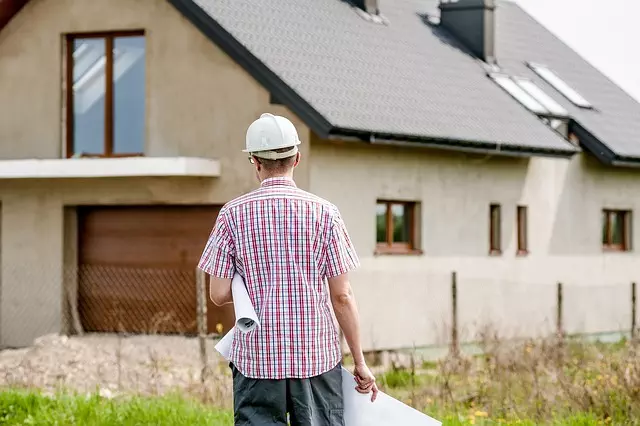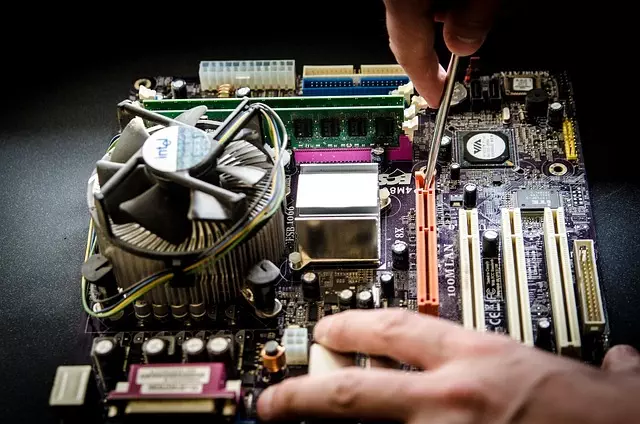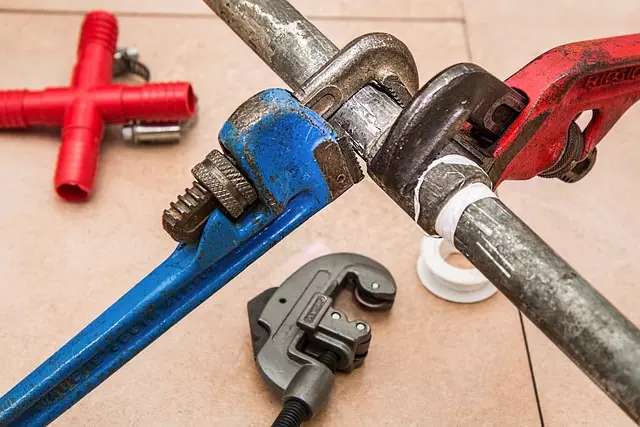When installing or repairing household appliances, it's crucial to follow safety standards, manufacturer guidelines, and local electrical codes. Proper maintenance, including regular cleaning, inspecting seals and gaskets, and ensuring safety features work correctly, is key to extending the lifespan of your appliances and maintaining their efficiency. Home Repair and Maintenance best practices dictate that homeowners should be vigilant in addressing both minor issues and significant malfunctions to prevent larger problems down the line. While many common issues can often be resolved independently, complex repairs or installations, especially involving electrical or gas systems, should be handled by certified technicians to avoid potential hazards and ensure compliance with safety standards. For appliances under warranty, it's important not to attempt unauthorized repairs that could void coverage. Recognizing the limitations of DIY skills and knowing when to call in professionals for Home Repair and Maintenance tasks is essential for protecting your family's safety and investment in your home. Regular service by experts can preemptively address minor issues, ensuring that your appliances operate efficiently and are installed correctly the first time.
Navigating home repair and maintenance involves a multifaceted approach, particularly when it comes to appliances that are integral to daily living. This article delves into the nuances of appliance installation for homeowners, offering insights on ensuring safe and efficient integration of new devices. It also provides a comprehensive guide to identifying and resolving common issues in appliance operation, empowering readers with troubleshooting skills. Understanding the critical role of certified technicians in maintaining appliance performance is another key aspect covered, highlighting the importance of professional servicing. For those interested in DIY upkeep, the article offers practical tips for routine appliance maintenance and care to extend the lifespan of your home’s essential tools. Lastly, it outlines clear criteria for recognizing when expert intervention is necessary, ensuring that you know when to call a professional for home repair and maintenance tasks beyond your capability.
- Understanding the Essentials of Appliance Installation for Homeowners
- Common Issues in Appliance Operation: A Guide to Troubleshooting and Repair
- The Role of Certified Technicians in Efficient Appliance Servicing
- DIY Tips for Routine Appliance Maintenance and Care
- When to Call a Professional: Knowing the Limits of Home Appliance Repair
Understanding the Essentials of Appliance Installation for Homeowners

When embarking on appliance installation in your home, it’s crucial to adhere to safety standards and manufacturer guidelines to ensure proper functionality and longevity. Homeowners should start by carefully reading the instruction manual associated with their new appliance, which provides specific details on dimensions, power requirements, and any necessary precautions. Proper placement is key; an appliance must be installed in a location that allows for adequate ventilation and space for maintenance access. It’s also important to consider the electrical load on your circuit; consult with a licensed electrician if you need to upgrade your home’s wiring to handle the appliance’s power needs.
Once the installation site is prepared, ensure all connections are secure and insulated according to local codes. For gas-powered appliances, a professional should always perform the installation to prevent any risks associated with gas leaks or improper gas lines. After the installation, regular maintenance checks are essential to maintain efficiency and prevent minor issues from becoming major repairs. Home Repair and Maintenance practices include routine cleaning, inspecting seals and gaskets, and testing safety features. By understanding these essentials of appliance installation and maintaining a regimen of home repair and maintenance, homeowners can ensure their appliances operate safely and effectively for years to come.
Common Issues in Appliance Operation: A Guide to Troubleshooting and Repair

Homeowners often encounter various issues with their appliances, which can range from minor malfunctions to significant breakdowns. Regular maintenance and timely repair are pivotal in ensuring these machines function efficiently and have a longer lifespan. When an appliance isn’t performing as expected, a systematic approach to troubleshooting is essential. Start by checking the basics: ensure all connections are secure, inspect for signs of wear or damage, and clear out any obstructions that might be interfering with proper operation. For instance, if a refrigerator is not cooling effectively, it could be due to a dirty condenser coil, a malfunctioning thermostat, or a faulty door seal. Addressing such common issues promptly falls under the umbrella of home repair and maintenance, and can often resolve the problem without the need for professional intervention. However, for more complex faults, consulting a qualified technician is advisable to avoid further complications. Regular servicing, understanding the appliance’s warranty terms, and keeping detailed records of repairs and maintenance history are practices that support proactive home repair and maintenance, thereby minimizing future issues and ensuring your appliances run smoothly for years to come.
The Role of Certified Technicians in Efficient Appliance Servicing

When an appliance malfunctions or requires installation, the expertise of certified technicians becomes paramount in efficient appliance servicing within home repair and maintenance. These professionals are trained to handle a wide array of appliances, ensuring that each is repaired or installed correctly the first time. Their knowledge encompasses the intricate workings of various machines, from refrigerators to washers, enabling them to swiftly diagnose issues and implement effective solutions. Certified technicians adhere to industry standards and safety protocols, reducing the risk of further damage or accidents during the repair process. By prioritizing precision and attention to detail, they not only extend the lifespan of appliances but also enhance their performance, contributing significantly to the overall well-being of a home’s systems. Engaging these experts for regular maintenance can prevent minor issues from escalating into costly repairs, thereby safeguarding against unexpected disruptions in daily life. Homeowners who invest in professional servicing by certified technicians gain peace of mind, knowing their appliances are functioning optimally and safely, a cornerstone of effective home repair and maintenance practices.
DIY Tips for Routine Appliance Maintenance and Care

Regular maintenance is key to prolonging the life of your home’s appliances and ensuring they operate efficiently. Simple DIY tasks can significantly reduce the likelihood of costly repairs down the line. Start by inspecting seals and gaskets on refrigerators, washing machines, and dishwashers to prevent leaks and energy loss. Clean or replace filters in HVAC systems regularly to maintain airflow and system efficiency. For ovens and stoves, clean the burners and coils to remove dust and debris that can impede performance and cause overheating. Taking a proactive approach with your appliances is a fundamental aspect of home repair and maintenance. Use manufacturer guidelines to understand the recommended service intervals for each appliance in your home. This includes checking water lines for wear, ensuring electrical connections are secure, and lubricating moving parts to prevent friction and wear. By staying vigilant and performing these routine checks, you can keep your appliances running smoothly and save yourself from more extensive repair work later on. Remember, a little maintenance now can prevent major headaches in the future, and it’s all part of responsible home repair and maintenance practices.
When to Call a Professional: Knowing the Limits of Home Appliance Repair

When DIY home repairs and maintenance are your go-to solutions for most issues, it’s crucial to recognize the boundaries of your expertise, especially when it comes to complex appliance installations or intricate repair jobs. Electrical and gas appliances pose significant risks if not handled by professionals trained in safety protocols and technical knowledge. For instance, if you encounter wiring issues during an appliance installation that requires a reconfiguration of your home’s electrical system, it’s wise to call a licensed electrician. Similarly, any gas-related repairs should be left to certified technicians due to the potential dangers of gas leaks and subsequent fires or explosions.
Moreover, certain appliances like refrigerators, ovens, and washing machines may have warranties that could become void if unauthorized persons attempt repairs outside of professional service channels. Additionally, the complexity of modern appliances often necessitates specialized tools and diagnostic equipment, which are typically available only to professionals in the field of home repair and maintenance. By understanding these limitations and opting for expert assistance when necessary, you ensure the safety of your household and the longevity of your appliances, ultimately protecting your investment in your home.
Homeowners can confidently navigate the complexities of appliance installation, operation, and maintenance with the insights provided in this article. From grasping the basics of proper installation to identifying common issues that may arise during appliance use, understanding the importance of professional servicing, and learning DIY tips for maintaining appliances, homeowners are now better equipped to handle these tasks or know when to seek expert assistance. Ensuring the longevity and efficiency of household appliances through regular maintenance and timely repairs is a critical aspect of home repair and maintenance, contributing to a safer and more functional living environment. Homeowners should remember that while some issues can be addressed independently, safety and effectiveness often dictate when professional intervention is necessary. This comprehensive guide serves as an invaluable resource for those looking to uphold their appliances with care and attention, ensuring they operate at peak performance for years to come.


